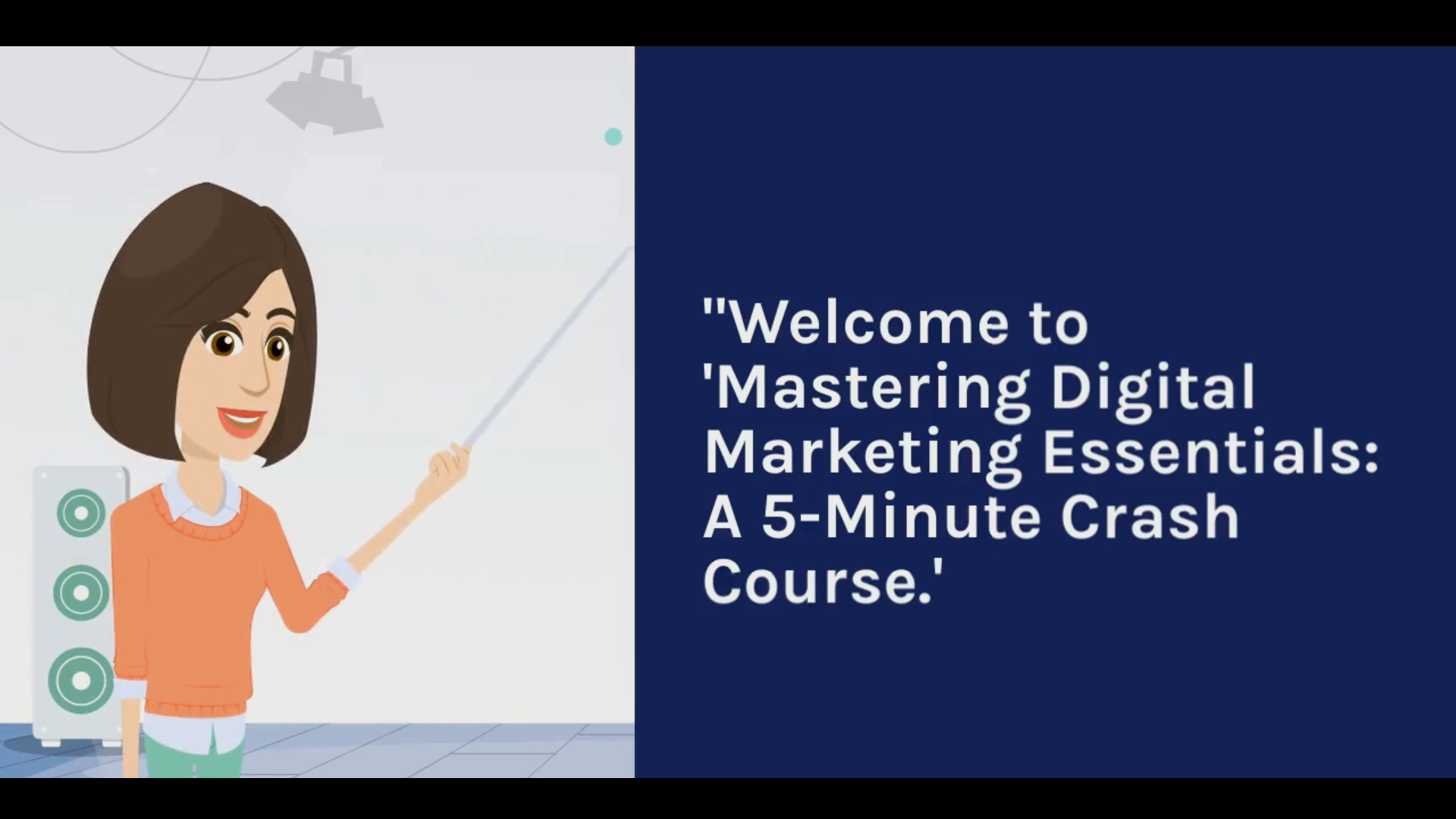
Looking to master digital marketing in just 5 minutes? This comprehensive article provides a quick yet insightful overview of the key concepts, strategies, and techniques involved in digital marketing. From understanding the basics to implementing effective strategies, this guide covers it all. Discover how to measure success in the digital marketing realm and gain valuable insights to boost your online presence. Get ready to enhance your marketing skills with this concise and informative read!
Digital marketing has become an essential component of any successful business strategy in today’s digital age. With the increasing reliance on technology and the internet, businesses must adapt and embrace digital marketing to effectively reach their target audience and drive growth.
At its core, digital marketing refers to the promotion of products or services using various digital channels such as websites, social media platforms, search engines, email marketing, and mobile applications. Unlike traditional marketing methods, digital marketing allows businesses to connect with their customers in real-time, engage with them on a more personal level, and measure the effectiveness of their marketing efforts accurately.
One of the key advantages of digital marketing is its ability to reach a global audience. With billions of people using the internet worldwide, businesses can now expand their reach beyond geographical boundaries and tap into new markets. This opens up endless opportunities for growth and expansion, regardless of the size or location of the business.
Another significant aspect of digital marketing is its cost-effectiveness. Compared to traditional marketing methods like print advertisements or television commercials, digital marketing offers a more affordable alternative. Small businesses with limited budgets can leverage digital marketing techniques to compete with larger corporations on a level playing field.
Furthermore, digital marketing allows for precise targeting and segmentation of the audience. Through data analytics and tracking tools, businesses can gather valuable insights about their customers’ preferences, behaviors, and demographics. This information enables them to create personalized marketing campaigns that resonate with their target audience, resulting in higher conversion rates and customer satisfaction.
In addition to its reach and cost-effectiveness, digital marketing also provides instant feedback and measurable results. Unlike traditional marketing, where it can be challenging to determine the impact of a campaign, digital marketing allows businesses to track and analyze their marketing efforts in real-time. They can monitor website traffic, click-through rates, conversion rates, and other key performance indicators to evaluate the success of their strategies. This data-driven approach empowers businesses to make informed decisions and optimize their marketing efforts for better results.
As the digital landscape continues to evolve, it is crucial for businesses to understand and embrace the fundamentals of digital marketing. By leveraging the power of digital channels, businesses can effectively engage with their target audience, drive brand awareness, and ultimately achieve their marketing goals. In the following sections, we will explore key concepts, strategies, implementation techniques, and success measurement in digital marketing to equip you with the essential knowledge needed to navigate this dynamic field.
Key Concepts and Strategies in Digital Marketing
In today’s digital age, mastering the essentials of digital marketing is crucial for businesses looking to thrive in the online world. With the ever-increasing reliance on technology and the internet, understanding key concepts and strategies in digital marketing can give you a competitive edge and help you reach your target audience effectively. In this section, we will explore some fundamental concepts and strategies that form the foundation of successful digital marketing campaigns.
Firstly, it’s important to understand the concept of target audience segmentation. Digital marketing allows you to reach a vast audience, but not all individuals within that audience will be interested in your products or services. By segmenting your target audience based on demographics, interests, and behaviors, you can tailor your marketing efforts to specific groups, ensuring that your message resonates with the right people at the right time.
Next, let’s delve into the power of search engine optimization (SEO). SEO is the practice of optimizing your website and its content to rank higher in search engine results pages. By incorporating relevant keywords, improving website speed and user experience, and obtaining high-quality backlinks, you can increase your website’s visibility and attract organic traffic. A well-executed SEO strategy can significantly enhance your online presence and drive targeted traffic to your website.
Another essential concept in digital marketing is content marketing. Content is king in the digital realm, and creating valuable, informative, and engaging content is key to attracting and retaining customers. Whether it’s through blog posts, videos, social media updates, or podcasts, delivering high-quality content that addresses your audience’s pain points and provides solutions can establish you as an authority in your industry and build trust with your target audience.
Social media marketing is another vital component of digital marketing. Platforms like Facebook, Instagram, Twitter, and LinkedIn offer immense opportunities to connect with your audience, promote your brand, and drive engagement. By crafting compelling social media campaigns, leveraging influencers, and utilizing paid advertising options, you can effectively reach and engage your target audience on these platforms.
Additionally, email marketing remains a powerful strategy in the digital marketing landscape. Building an email list of interested prospects and customers allows you to nurture relationships, deliver personalized content, and drive conversions. By leveraging automation tools, segmenting your email list, and crafting compelling email campaigns, you can maximize the impact of your email marketing efforts and achieve higher conversion rates.
Lastly, understanding the importance of analytics and data-driven decision-making is crucial in digital marketing. By measuring key performance indicators (KPIs) such as website traffic, conversion rates, click-through rates, and social media engagement, you can gain valuable insights into the effectiveness of your marketing campaigns. These insights enable you to make data-driven decisions, optimize your strategies, and allocate resources more efficiently, ultimately leading to better results and ROI.
In conclusion, mastering the key concepts and strategies in digital marketing is essential for businesses aiming to succeed in the online world. By understanding target audience segmentation, search engine optimization, content marketing, social media marketing, email marketing, and analytics, you can create effective digital marketing campaigns that drive engagement, increase brand visibility, and generate tangible results. Stay tuned for the next section, where we will explore how to implement these techniques effectively.
Implementing Digital Marketing Techniques
Now that you have a solid understanding of the key concepts and strategies in digital marketing, it’s time to dive into the practical aspect of implementing these techniques. In this section, we will explore the various methods and tools you can use to effectively execute your digital marketing campaigns.
Website Optimization:
Your website is the foundation of your online presence, so it’s crucial to optimize it for search engines and user experience. Start by conducting keyword research to identify relevant keywords for your industry. Incorporate these keywords naturally into your website’s content, meta tags, and URLs. Additionally, ensure that your website is mobile-friendly, as an increasing number of users access the internet through their smartphones.
Content Marketing:
Content is king in the digital marketing world. Create high-quality, engaging content that resonates with your target audience. This can include blog posts, videos, infographics, podcasts, and more. Develop a content calendar to plan and organize your content creation efforts. Remember to promote your content on social media platforms and engage with your audience to foster brand loyalty.
Search Engine Optimization (SEO):
SEO plays a vital role in driving organic traffic to your website. Optimize your website’s structure, meta tags, headings, and alt tags to improve its visibility on search engine results pages. Focus on creating valuable, informative content that answers users’ queries and incorporates relevant keywords. Build quality backlinks from reputable websites to enhance your website’s authority.
Social Media Marketing:
Leverage the power of social media platforms to connect with your target audience. Identify the platforms where your audience is most active and create compelling profiles. Develop a social media strategy that includes regular posting, engaging with followers, running targeted ads, and analyzing performance metrics. Use social media management tools to streamline your efforts and schedule posts in advance.
Email Marketing:
Email marketing remains one of the most effective ways to nurture leads and drive conversions. Build an email list by offering valuable content or incentives in exchange for subscribers’ contact information. Segment your email list based on demographics, interests, or previous interactions to send personalized and targeted campaigns. Craft compelling subject lines and optimize the email content for mobile devices.
Pay-Per-Click (PPC) Advertising:
PPC advertising allows you to display ads on search engine results pages or other websites and pay only when users click on them. Conduct thorough keyword research and create highly relevant ad copy to maximize your ROI. Set a budget, monitor your campaigns regularly, and make necessary adjustments to improve their performance. Consider using retargeting techniques to reach users who have previously shown interest in your products or services.
Remember, digital marketing is an ever-evolving field, so it’s important to stay updated with the latest trends and techniques. Continuously analyze your campaigns’ performance using analytics tools and make data-driven decisions to optimize your strategies. With consistent effort and experimentation, you’ll be able to refine your digital marketing techniques and achieve your business goals.
Measuring Success in Digital Marketing
In the fast-paced world of digital marketing, it is crucial to measure the success of your efforts. Without proper measurement and analysis, it becomes difficult to determine whether your strategies are effective or if they need adjustments. In this section, we will explore the various metrics and tools that can help you measure success in digital marketing.
One of the key metrics to consider is website traffic. By analyzing the number of visitors to your website, you can gain insights into the effectiveness of your digital marketing campaigns. Tools like Google Analytics provide detailed information about the source of your traffic, such as organic search, social media referrals, or paid advertisements. This data allows you to identify which channels are driving the most traffic and make informed decisions about where to allocate your resources.
Another important metric is conversion rate. Conversion rate measures the percentage of website visitors who take a desired action, such as making a purchase, filling out a form, or subscribing to a newsletter. By tracking conversion rates, you can assess the effectiveness of your landing pages, calls-to-action, and overall user experience. A low conversion rate may indicate that there are issues with your website or marketing messages that need to be addressed.
Customer engagement is another crucial aspect to measure success in digital marketing. Metrics such as click-through rates (CTR), bounce rates, and time spent on page can provide valuable insights into how engaged your audience is with your content. High CTRs indicate that your ads or email campaigns are compelling and driving users to take action. On the other hand, high bounce rates or short time spent on page may suggest that your content is not resonating with your target audience.
Social media metrics also play a significant role in measuring success in digital marketing. The number of followers, likes, shares, and comments can indicate the level of engagement and brand awareness generated through social media platforms. Additionally, sentiment analysis tools can help you understand the overall sentiment surrounding your brand or campaigns, allowing you to make necessary adjustments to improve customer perception.
Lastly, return on investment (ROI) is a critical metric to assess the overall success of your digital marketing efforts. ROI measures the profitability of your campaigns by comparing the cost of your marketing activities to the revenue generated. By tracking ROI, you can determine which campaigns are delivering the highest returns and allocate your budget accordingly.
Measuring success in digital marketing involves analyzing various metrics such as website traffic, conversion rates, customer engagement, social media metrics, and ROI. These metrics provide valuable insights into the effectiveness of your strategies and help you make data-driven decisions to optimize your digital marketing efforts. Remember, continuous measurement and analysis are essential for staying ahead in the ever-evolving digital landscape.
.png)
.png)






